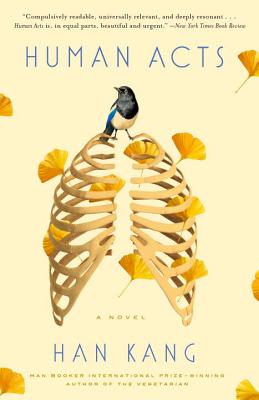A long time ago, I wrote about how science fiction helped me appreciate historical fiction. The TL;DR is that for a long time, I was an idiot who looked down on historical fiction; it took me experiencing science fiction to appreciate historical fiction.
And now, I’d like to share another embarrassing detail about myself: most of the historical fiction I’ve experienced has been set in the West, mostly in Europe or North America. And I was reading mostly about people, places and times that I already knew something about.
Human Acts by Han Kang was a reminder of how limited my exposure to historical fiction has been. This is something I’d really like to rectify.
This post may contain affiliate links, which means I’ll receive a commission if you purchase through my links, at no extra cost to you. Please read full disclosure for more information.
Summary
Human Acts was originally written in Korean by Han Kang and translated into English by Deborah Smith.
Kang’s novel is set in South Korea. In May 1980, a series of student lead uprisings occurred in the city of Gwangju. These uprisings were violently suppressed by the military, with the support of the Carter administration in the US.
Thoughts
Human Acts is told from multiple perspectives of those involved or otherwise impacted by the uprisings. Because it’s an ensemble cast, some of the POVs are women, some are men. This allowed us to see how women were impacted by these events as compared to their male counterparts.
I don’t know what else to say about Kang’s novel other than that it is absolutely brutal. Instead of starting with the event itself, Human Acts begins with dead bodies. Descriptions of what dead bodies looked like and what the loved ones of the dead experienced trying to find the remains of those they loved.
We also spend time with the consciousness of someone coming to terms with the fact that he is dead. We encounter the brutality of being imprisoned after the fact. Years later, the events of the Gwangju uprising continue to be felt.
It’s interesting that the Gwangju uprising is relatively recent history. It occurred only a few years before I was born, and there are surely still people alive today who remember these events.
As you’ve probably surmised, I didn’t know about the Gwangju uprising going into Kang’s novel. My understanding of Korean history is embarrassingly limited. I know the US fought a war in the country, but my understanding of what led up to the war and how the US got involved is very surface level.
And that’s on me. I could make excuses about how my history classes in school didn’t really cover a lot of Korean history, but I’m at the point where I’m able to seek out this information on my own. That’s exactly what I should have done long ago.
Trigger Warnings for Human Acts
Human Acts contains graphic descriptions of things like rape and torture. Additionally, Kang’s novel features pretty explicit descriptions of decomposing bodies.
This post may contain affiliate links, which means I’ll receive a commission if you purchase through my links, at no extra cost to you. Please read full disclosure for more information.
Updated:
